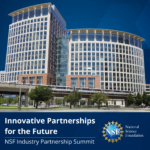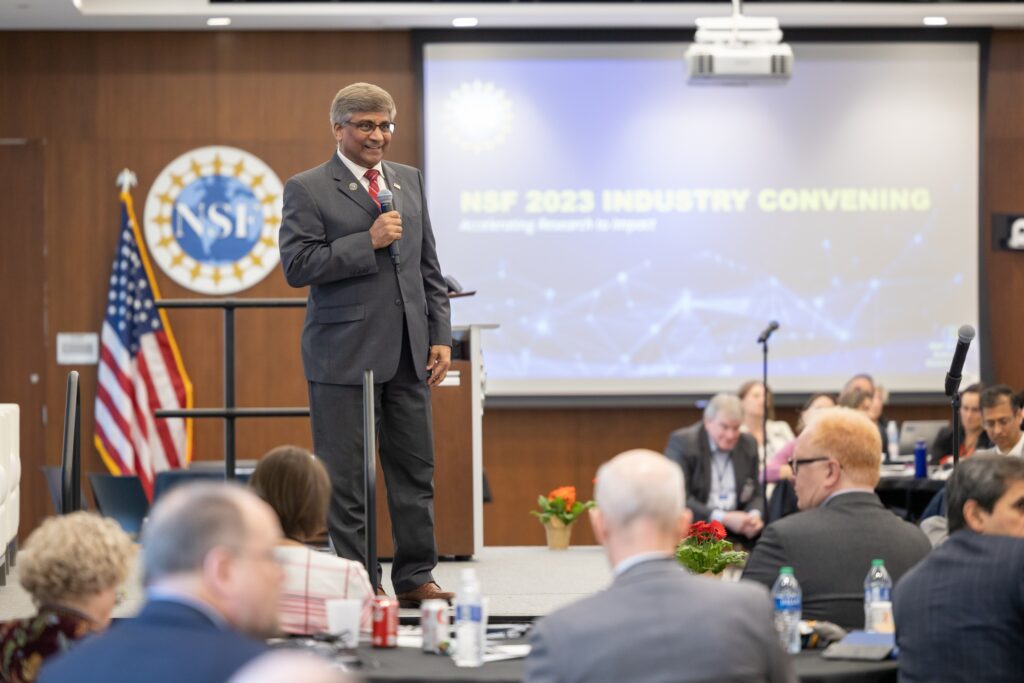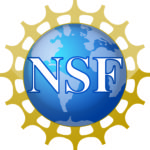Innovative Partnerships for the Future: NSF Industry Partnership Summit
 On April 26, 2023, at the National Science Foundation’s headquarters in Alexandria, VA, UIDP convened 63 science and technology leaders representing 49 leading companies with significant R&D spending, as well as nonprofits that invest in technology research. Attendees actively participated in discussions to identify how industry could better engage in public-private partnerships—in previously tested and new ways—to foster vibrant innovation growth through highly collaborative, multi-sector funding programs that support use-inspired and translational research. Importantly, while the meeting was supported by NSF’s Technology, Innovation and Partnerships Directorate, in keeping with its mission of serving as a crosscutting directorate, all NSF directorates and offices participated.
On April 26, 2023, at the National Science Foundation’s headquarters in Alexandria, VA, UIDP convened 63 science and technology leaders representing 49 leading companies with significant R&D spending, as well as nonprofits that invest in technology research. Attendees actively participated in discussions to identify how industry could better engage in public-private partnerships—in previously tested and new ways—to foster vibrant innovation growth through highly collaborative, multi-sector funding programs that support use-inspired and translational research. Importantly, while the meeting was supported by NSF’s Technology, Innovation and Partnerships Directorate, in keeping with its mission of serving as a crosscutting directorate, all NSF directorates and offices participated.
There were three key objectives for the NSF Industry Partnership Summit:
- Strategy Development. Shape effective strategies for partnering across research, workforce development, and infrastructure—explore opportunities to expand public-private partnerships and characteristics of new funding modalities.
- Sector Interest. Identify several “coalitions of the willing,” or companies in a sector highly interested in pursuing deeper discussions on partnership opportunities in research or workforce development
- Greater Engagement. Expand industry awareness of the opportunities for public-private partnerships to accelerate research and workforce development.

NSF Director Sethuraman Panchanathan addresses the NSF Industry Partnership Summit. Image Source: National Science Foundation.
Key Findings
- Increase industry participation in NSF efforts. One overarching need is to expand the number and size of companies that co-invest with NSF in funding opportunities. Small to medium-sized companies and startups offer valuable use cases, facilities, and technical capabilities, but lack resources internally to support ongoing engagement, such as project managers and partnership officers. An NSF resource to assist with coaching and simplification of processes could make broader participation possible.
- Develop new IP approaches. Funded research can lead to new discoveries, and the intellectual property (IP) emanating from research can create opportunities for potential development if the pathway to commercialization is transparent, rational, and not needlessly complex. NSF has developed approaches that work, but new models are needed for companies to partner at different investment levels, including new IP management approaches. Models are also needed that recognize tangible, non-monetary contributions such as facilities, use cases, and other in-kind assets as co-investment options. Selecting from a menu of approaches and options from the start would simplify decision making for companies that desire to collaborate.
- Move faster. There is a need to reduce the timescale for NSF engagement (from idea to solicitation) and to reduce the paperwork burden so industry can more easily collaborate with NSF. One option is to consider co-funding pilot programs with the option to scale and increase investment at the three to six-month mark.
- Improve communication. Regular, industry-facing communication from NSF is needed to inform companies about opportunities to meaningfully engage in research activities. There is also a need for an NSF web presence specifically for industry partners (and potential collaborators).
- Facilitate greater connectivity. Participants desire regularly established meetings that bring industry representatives together to share challenges and identify solutions, segmented by technology interest area. Meeting with NSF program managers that align with research interest areas could offer opportunities for industry representatives to help inform and shape future funding opportunities and build informed technology roadmaps.
- Strengthen experiential learning opportunities. For workforce development, find ways to connect NSF-supported researchers and Ph.D. students with experiential opportunities in industry. Upskilling through non-degree coursework, certifications, and practicum experience offers additional ways to expand the talent pool.
- Fund work closer to industry research interests. To make the transition to translational research, support projects at the technology readiness level (TRL) of three or higher.
- Create onramps for new partners. Approaches that allow for additional companies to join projects after initial funding rounds would allow more companies to participate, perhaps at lower funding levels if offering in-kind value (use cases, test beds, etc.).
- Advance soft-skill capabilities. Design thinking, communication, and multidisciplinary team dynamics are workforce needs that should be emphasized alongside technical skills in both academic and experiential learning.
- Raise researcher awareness. Support engagement with academic researchers so they understand the value of use-inspired and translational research and how it relates to economic growth.
- Develop support tools. A co-investment model involving industry and NSF could be leveraged to stand up tools that could be used across an industry sector, e.g., data standardization and platforms, digital twin capabilities, etc.
- Cultivate multi-agency work. Engage in multi-agency (and multinational agency) funding for technology development in grand challenges to pool more resources and accelerate progress.
Summit Presentations
TIP Directorate Overview, presented by Assistant Director Erwin Gianchandani
Directorate Summary Slides, with information for engagement with NSF Bio; Computer Information Science & Engineering; STEM Education; Engineering; Geosciences;, Mathematical and Physical Sciences; Social, Behavioral, and Economic Sciences; and the Office of Integrative Activities.
 This workshop was funded by the National Science Foundation through Award #2318858
This workshop was funded by the National Science Foundation through Award #2318858


